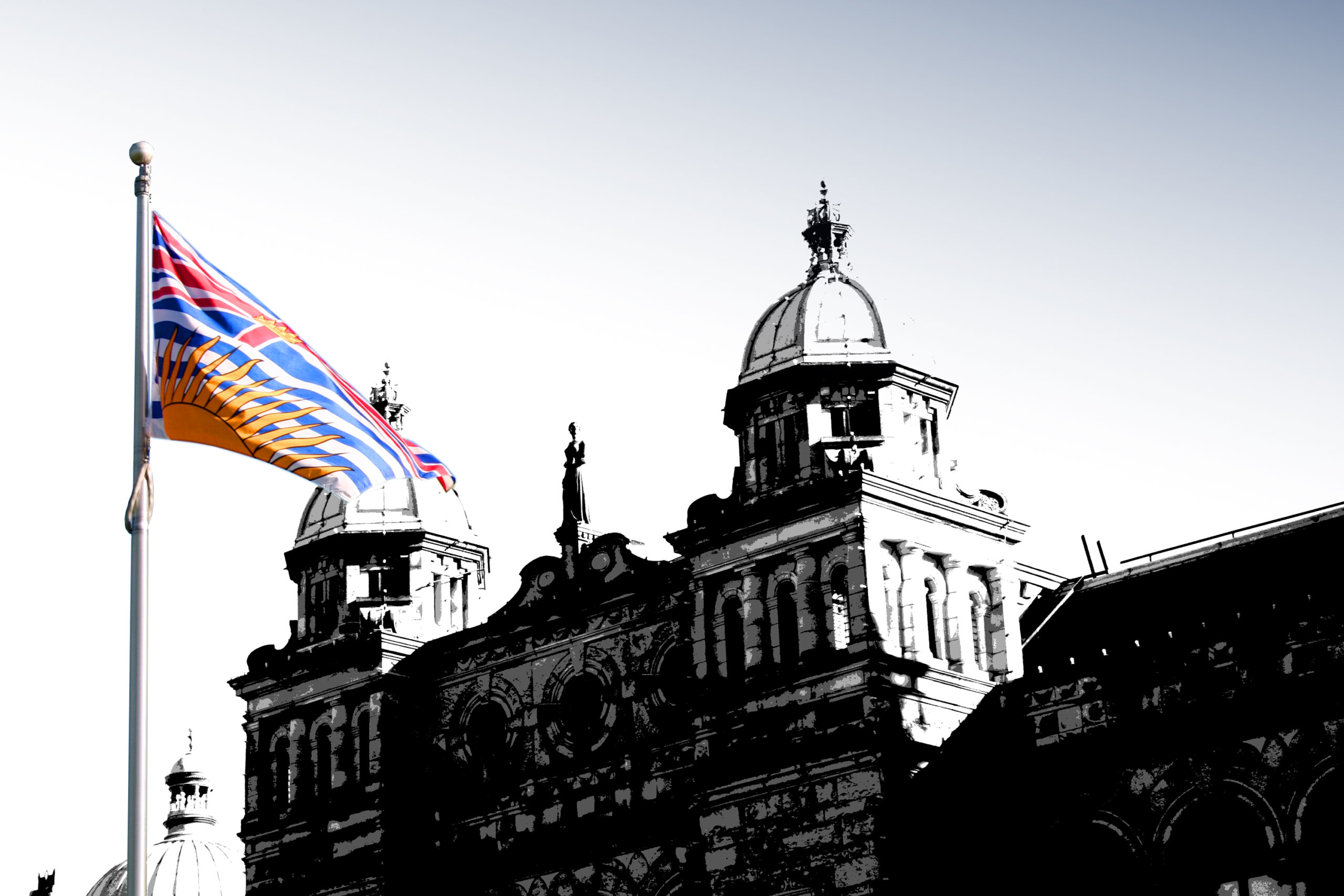State of play
The British Columbia legislature concluded its first session on May 29, since being constituted following last October’s general election. Despite having a slim majority, B.C. NDP Premier David Eby’s government packed a lot into the shortened session that began in February. After the 278-day hiatus from the legislature, this session operated in a contentious situation with the province facing President Donald Trump’s tariffs, an affordability crisis, and a worsening public health emergency due to the fentanyl crisis.
The composition of the legislature is tightly balanced, with the B.C. NDP securing exactly the forty-seven seats needed for a majority in the 93-seat legislature. This session tested the government’s Co-operation and Responsible Government Accord (CARGA) with the two-member B.C. Green Party. Also, during this session, three members of the B.C. Conservative opposition left the caucus to sit as Independents, further weakening the B.C. Conservative Official Opposition. This situation, coupled with the high number of new MLAs elected to this legislature, made for a dynamic session.
This session felt like a reset: an NDP government with a new mandate trying figure out how to govern after a 9-month break; the first term for Premier Eby and his new cabinet with some significant new portfolios; an opposition trying to find its feet; and an uncertain economic future. The parties will return to their constituencies for the summer, with the legislature scheduled to resume on October 6.
On the economic front, B.C. is facing slowing growth, a strained housing market, and anxiety about the economic uncertainty coming from the actions of our southern neighbor. This was reflected in Budget 2025, which forecasted a record-breaking $10.9 billion deficit. This has been generally seen however as an investment deemed necessary for long-term economic and market stability.
B.C. is also facing an inflation rate 0.3% higher than the national average, primarily being driven up by inflated housing costs in the province. This was not helped by the fact that construction began on fewer new units in 2024 than 2023.
The province’s unemployment rate did increase slightly from 6.1% to 6.2% in April, however, it remains lower the national average of 6.9%, and well below Ontario’s unemployment rate of 7.8%. These labour shortages persist in critical sectors, with many job vacancies in health and social assistance.
Canada-U.S. relationship
Canada-U.S. relations have been at the forefront of the B.C. political consciousness, as it has been for much of the country. With the widespread nature of the tariff threat, and in particular for B.C. the targeting of the forestry industry, one of B.C.’s largest exports and a large employer throughout the province. Much of the government’s focus has been on ensuring economic growth continues across the province, and important sectors are adequately protected.
To do this, the government has introduced the Economic Stabilization (Tariff Response) Act, which gives the cabinet emergency-style powers to react to foreign trade actions. It allows cabinet to impose retaliatory tariffs, expedite support for the affected industries, and override provincial procurement regulations. The Tariff Response Act has been controversial thus far, with opposition arguing that it is a power grab, setting the precedent for executive overreach with limited legislative oversight.
Premier Eby has taken a strong stance against U.S. President Donald Trump, being the most outspoken provincial leader second to only Ontario Premier Doug Ford. Premier Eby immediately pulled all “red” or Republican states liquor products off the shelves of BC Liquor Stores and urged British Columbians to buy Canadian and went as far as suggesting they should avoid American travel.
The bottom line is that the Canada-U.S. file will be even more central to B.C’s economy and political landscape as we move into the summer and the next sitting session of the B.C. legislature.
Government priorities
The campaign platform that led Premier Eby and his BC NDP government to victory in October outlined promises and priorities of the upcoming sitting. Premier Eby circled back to what he calls “the basics” of governance, which are affordability, housing, healthcare, and public safety.
These priorities were showcased in the government’s Speech from the Throne, which demonstrated a focus on building a strong economy in a tumultuous time of tariffs, improving healthcare, building more homes, and increasing manufacturing opportunities. The speech also outlined the government’s willingness to expediting eighteen major projects across the province, aiming to create more than 8,000 new jobs, particularly in the rural and northern communities.
Shortly after the sitting began, in March 2025, the BC NDP and B.C. Greens finalized the Cooperation and Responsible Government Accord (CARGA), which sets out the policy initiatives and deliverables for 2025. CARGA focuses on health and mental health care, housing and homelessness, transit, climate and the environment, social and economic justice, taxation levels, and democratic and electoral reforms. Only some of these priorities were highlighted in Budget 2025, Standing Strong for B.C, which doubles down on a “build and protect” strategy: build more infrastructure and housing, while protecting affordability and public services.
Budget 2025: Standing Strong for B.C.
Brenda Bailey, British Columbia’s Finance Minister, announced the budget shortly after the onset of Trump’s inflammatory tariffs. This budget, entitled “Standing Strong for B.C.” was framed as a simple budget with “[no] new splashy announcements”, prioritising British Columbians and small businesses in these uncertain times.
The focal point of criticism coming from this budget was the record projected $10.9 billion deficit. Minister Bailey and Premier Eby defended their decision, positioning it as a calculated and necessary risk to take, allocating billions of dollars into housing construction, public health care expansion, and climate resilience.
There have been vocal critics who call the budget “reckless”, but also supporters who are in favour of doing what is needed to work through the affordability crisis. However, the relief cheques promised during the campaign to many households aimed at relieving some financial pressures were not included in the budget, raising the question of the consequence of reneging on a significant campaign promise during a particularly difficult time when the government needs continued support and public trust.
Still, the BC NDP government is widely following its core identity while being pragmatic. There were a few shocks within the BC NDP’s legislation, including cuts to the consumer carbon tax. However, this is considered by Premier Eby as financial relief to working-class families instead of an abandonment of climate goals.
Other priorities include:
- Housing: Expanding public and non-profit construction homes, zoning reform, and supports for first-time home buyers.
- Climate: Providing funding for wildfire response, EV incentives, and community resilience projects.
- Public Health and Safety: Providing increased funding for public safety in urban centres.
Premier Eby and his government have made their priorities clear: they are willing to invest now to build fast and help the vulnerable. However, whether the implementation of these concepts is as successful as the ambition remains to be seen.
A closer look at the Infrastructure Projects Act
A key tenet of the government’s infrastructure ambitions is the introduction of the Infrastructure Projects Act (Bill 15). This Act was proposed as a significant change and aims to streamline how major public projects get approved and funded. Theoretically, this can cut unnecessary red tape and allow the province to get started on projects far faster.
In practice, however, the legislation met much resistance, both from municipalities, opposition parties, Indigenous groups, and environmental organizations, citing concerns regarding consultation timelines and agreements and a lack of environmental oversight. They all agree that it is important to continue building infrastructure, but that the speed at which it is done should not come at the expense of autonomy or due diligence.
The controversy surrounding the bill intensified because it was also a confidence motion. The stakes were high, as the government risked falling if it failed to pass. Ultimately, the legislation cleared third reading on the second to last night of the session, with Speaker Raj Chouhan casting the deciding vote in favour. The B.C. Conservatives, B.C. Greens, and Independent MLAs all opposed the bill.
Adding to the tension, B.C. Conservative MLA Peter Milobar raised a point of order, claiming that the Minister of State for Trade’s vote should be disqualified due to a blurred virtual background, which he argued contravened the legislature’s guidelines for online participation. The Speaker swiftly dismissed the objection and ruled the vote valid. However, the exchange highlighted the opposition’s willingness to use procedural and administrative tactics in an effort to destabilize the BC NDP government’s precarious hold on power. This dynamic is likely to continue into the fall session.
Ahead of the vote, Infrastructure Minister Bowinn Ma stated that the next step would be to define the minimum eligibility criteria for what qualifies as a “provincially significant project” – a step that critics argue should have occurred prior to the bill’s introduction, not afterward.
Where the Parties are at
The political landscape in B.C. right now is dynamic. While the BC NDP holds a majority government, its razor-thin nature poses a degree of uncertainty in the legislature. The official opposition will continue to try and build off their electoral gains, while struggling with the growing pains that come from a party that grew quickly.
BC NDP
The BC New Democratic Party continues to govern with a majority in the legislature and relatively high public support. Premier Eby has generally managed to keep his caucus together and functional, with some notable cabinet assignments including Brenda Bailey to Finance, Josie Osborne to Minister of Health and Ravi Kahlon as Minister of Housing and Municipal Affairs. Premier Eby’s public approval ratings have enjoyed a “Trump bump” and he is seen to be a public defender of B.C.’s and Canada’s economic interests in the face of tariff threats. But after nearly eight years in power, and some missteps in executing an ambitious agenda while bringing key stakeholders along, there are questions emerging about the sustainability of this party’s governance. The lack of electoral representation in rural and regional areas of the province is a challenge that Premier Eby and his team will have to address through responsive policy and programs, and dedicated attention to relationships particularly with local governments and First Nations.
BC Conservatives
The BC Conservatives are currently riding a wave of populist sentiment and voter frustration that may have spilt over from federal politics. Despite outperforming expectations majorly in the October 2024 election, the internal tensions within the caucus have been noticeable. They culminated with MLA Dallas Brodie’s removal from the Conservative Party of BC after she claimed that there were “zero” children buried at the former Kamloops Indian Residential School. In solidarity, two of her caucus members also chose to leave the Conservative Party, and now all three are sitting as independents. This obviously raises serious questions about the cohesion within the party and its leadership.
The voter base of the party remains focused on the hot-button issues like lowering taxes and reducing crime, but the party seemingly still lacks policy depth and clear strategy, specifically to gain more support within the urban areas. Unless they can mature quickly, as an emerging party of power, they risk their support plateauing.
BC Green Party
The BC Greens are facing an ongoing leadership transition, with Sonia Furstenau stepping aside after losing her seat and interim leader Jeremy Valeriote taking over its leadership until the fall 2025 leadership race. They are retaining a loyal base, particularly on Vancouver Island, and among the more progressive parts of the mainland, and were able to retain party status.
Overall, housing, the climate, and democratic reform remain key principles for the Greens, but with little legislative influence, the impact they will have on legislation is unsure. However, the CARGA agreement with the BC NDP will be something to look for in the upcoming legislative session once they return in October.
Progress of bills
The legislature has passed fourteen pieces of legislation this session, including two private members’ bills, one from each side of the house (rarely seen). Three other bills will be considered in the fall session.
List of legislation passed (government bills):
- Acting Conflict of Interest Commissioner Continuation Act.
- Protected Areas of British Columbia Amendment Act, 2025.
- Business Practices and Consumer Protection Amendment Act, 2025.
- Budget Measures Implementation Act, 2025.
- Supply Act (No. 1), 2025.
- Economic Stabilization (Tariff Response) Act.
- Carbon Tax Amendment Act, 2025.
- Employment Standards Amendment Act, 2025.
- Miscellaneous Statutes Amendment Act, 2025.
- Renewable Energy Projects (Streamlined Permitting) Act.
- Infrastructure Projects Act.
List of legislation passed (members bills):
- Eligibility to Hold Public Office Act (Darlene Rotchford, BCNDP MLA for Esquimalt Colwood).
- Perinatal and Postnatal Mental Health Strategy Act (Jody Toor, BC Conservative MLA for Langley Willobrook).
List of legislation introduced and carried over to next session (government bills):
- Health Care Costs Recovery Amendment Act, 2025 – First Reading
- Attorney General Statutes Amendment Act, 2025 – First Reading
- Motor Vehicle Amendment Act, 2025 – First Reading
List of legislation introduced and carried over to next session (members bills):
- Low Carbon Fuels Amendment Act, 2025 (Kiel Giddens) – First Reading
- Free Trade and Mobility Within Canada Act (John Rustad) – First Reading
- Mental Health Amendment Act, 2025 (Elenore Sturko) – Second Reading
- Interpretation (Pacific Daylight Time) Amendment Act, 2025 (John Rustad) – First Reading
- Greenhouse Gas Industrial Reporting and Control Repeal Act (Peter Milobar) – First Reading
- Emergency and Disaster Management Amendment Act, 2025 (Macklin McCall) – First Reading
- Tax Relief and Tariff Defence Act (Dallas Brodie) – First Reading
- Korean Heritage Month Act (Paul Choi) – Second Reading
- Zero-Emission Vehicles Repeal Act (Hon Chan) – First Reading
- Income Tax (Grocery Rebate Guarantee) Amendment Act, 2025 (John Rustad) – First Reading
- Drug Use Prevention Education in Schools Act (Steve Kooner) – First Reading
- Firefighters’ Health Act (Misty Van Popta) – First Reading
Insights in this piece contributed by Anita Zaenker, Bailey Stafford, Julia Ramos, Dugald Lamb, and Lisa Marykuca.








